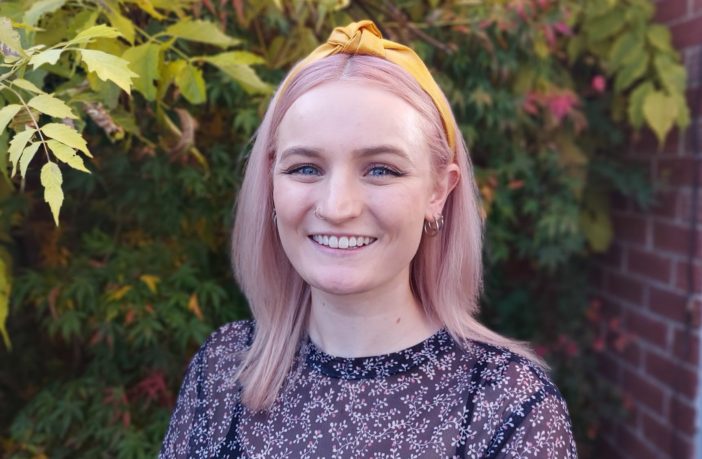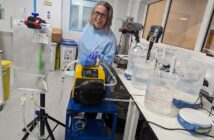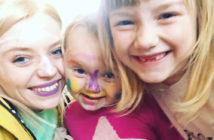An Open University PhD student is researching how to transform food waste such as vegetable peels into environmentally friendly packaging.
Katy Woodason, 23, hopes her findings could help to reduce the mountains of plastic pollution that litter our oceans, cities, and countryside every year.
“I’m really interested in the environment,” says Katy. “I feel there’s a lot of pressure on my generation especially to tackle issues such as plastic pollution, as we’ve been bombarded with research saying the planet is dying and time is running out to fix it. I knew it was an area I needed to get into.
“Every year, millions of tonnes of plastic are thrown away, harming wildlife and leaching harmful chemicals into the natural world. At the same time, a third of food produced for human consumption globally goes to waste. When the agriculture industry accounts for 70% of our freshwater use and around a third of our overall greenhouse gas emissions per year, the impact of any wasted food resources is pretty huge and unnecessary.
“I want to find a way to reuse unwanted food to eliminate single-use packaging and also reduce food waste. This will help to feed more of the global population and hopefully reduce our overall environmental impact.”
‘We need to stop thinking everything is disposable’
Using her background in forensic science, Katy is interested in breaking down the components of processed fruit and vegetable waste to discover the hidden benefits of items that are so often binned. She said: “We need to stop thinking of things as being disposable and start really looking at what parts can be utilised.”
Her research – which is supported through the EPSRC Training Grant DTP 2020-2021 Open University – could help uncover a new approach to how we recycle food products:
“I’m investigating turning waste products such as food into active additives and biopolymers to create a new biodegradable packaging. I take products such as vegetable peels and pomace from processing plants and add them to natural biopolymers derived from seaweed and seafood waste. I want to see if the waste has any antioxidants or antimicrobial properties that can help improve how we store food.
“This can help reduce food waste in a number of ways. Firstly, I’m re-using the food and agricultural waste that isn’t good-looking enough to go on supermarket shelves (think wonky veg!) to create antioxidant films. Wrapping food in this packaging then helps to extend the life of foods like meats and dairy which often go rancid as a result of oxidation. The idea is that we can recycle unwanted food into a packaging alternative that can actually keep food fresher for longer – resulting in less food waste all round.”
Fighting climate change through research
Though Katy has made positive progress so far, she admits it will be a lengthy process spent in the lab. “Currently, the films I’ve created are partially soluble in water, which isn’t ideal for food packaging. That’s one of the fundamental areas I will tackle next.”
Her area of research is still relatively unexplored, which means Katy is constantly testing the boundaries of what’s possible:
“I always hated plastic and thought that we needed to completely get rid of it. Yet through my PhD studies, I’m realising that there isn’t going to be one solution that can single-handedly replace the food packaging system we have now. It’s got to be lots of different innovative solutions with a sustainability drive behind them. I think that’s where the focus needs to be.”
Studying a PhD at the OU
Katy began her research during the pandemic and is now in her second year of OU study. She divides her time between research at home and conducting lab-based experiments at the OU campus in Milton Keynes.
“I didn’t realise the OU was a postgraduate institution,” Katy admits. “It was only when the PhD came up that I realised how much the OU does. The OU has a really big influence on research.
“Now that I’m here, it’s completely exceeded my expectations. Everyone is so nice and there is a real sense of community. I’m really enjoying life at the OU. It’s the best place for me because I need that supportive environment.
I think postgraduate research is about making mistakes and learning things along the way, rather than having the pressure for everything to be perfect first-time. I think the OU is really good at cultivating that positive environment.”
Looking ahead, Katy hopes her research can be used in the global fight against climate change.
“The dream is to tackle the problems of food waste and plastic pollution simultaneously. The naysayers might believe that we can’t do both at the same time, but I believe we can.
“After completing my PhD, I’m not sure what my next step is yet, but I know where I want to be, and that’s somewhere where people are making the greatest impact towards building a better future for our people and our planet.”
LEARN MORE
- Every year we help thousands of students like Katy achieve amazing things. Join them and learn more about the OU’s postgraduate programmes
- If you’re inspired to take action to tackle the climate crisis, check out how our short, skills-based microcredential courses could help
- Watch Katy discuss more about her innovative research in the below video:



